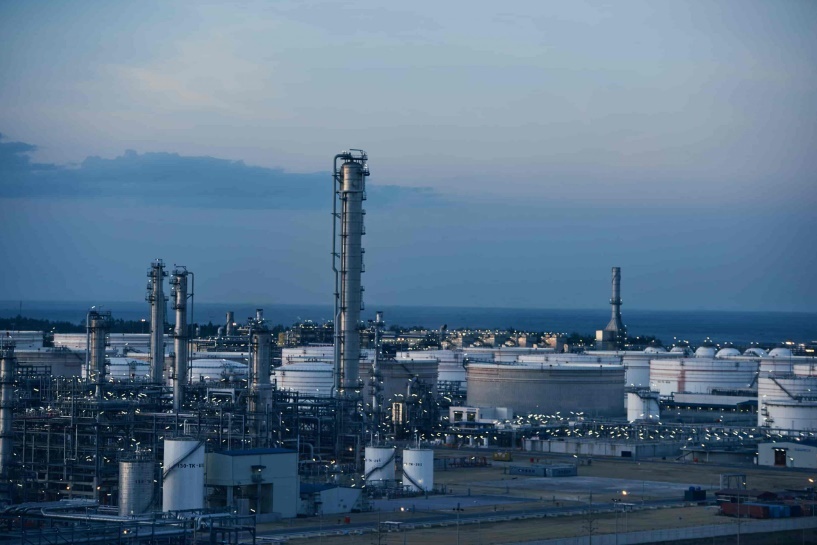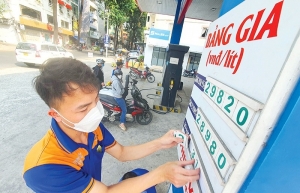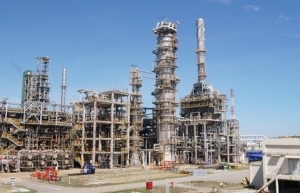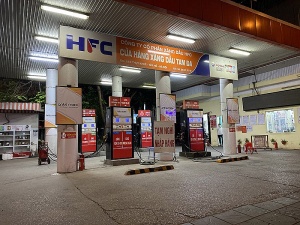Gasoline market under pressure ahead of November 21 operating period
Three days after the government published Public Statement No.1085/CD-TTg regarding the administration and management of petroleum products, supplies were still limited. The fuel scarcity has expanded from a few southern provinces last month to affect numerous areas, including Hanoi.
In the Official Gazette, the government instructed the chairman of the Board of Members of state-run PetroVietnam to ensure that Nghi Son Refinery and Petrochemical Company and Binh Son Refining and Petrochemical Company form a solid plan to allocate petroleum, giving priority to the inventory levels of enterprises that have been importing gasoline and oil to help offset costs.
 |
| Nghi Son Refinery & Petrochemical. Source: nsrp.vn |
The primary factors influencing supply
According to the Ministry of Industry and Trade (MoIT), the total petroleum source will reach 18.6 million cubic metres by November, meeting 90 per cent of 2022's consumption demand. On November 12, a day following the prime minister's directive, the MoIT issued a decree requiring wholesalers and distributors to sign an agreement to deliver sufficient gasoline and oil to retail establishments.
However, the disruption of petroleum supplies in some parts has made it more difficult to enhance independence from local supply.
Initial monitoring results from the National Assembly Committee on Finance and Budget indicate that the finances and business production of the Nghi Son Refinery (NSR) project are extremely concerning, with the project struggling financially and negative capital continuously being one of the most significant factors affecting domestic petroleum supply in 2022.
On November 11, the National Assembly decided to adopt the resolution on central budget allocation in 2023 but was asked to estimate the amount needed to balance the NSR's product offtake price in 2023 and report back at the next session.
In the central budget allocation plan for 2023, the government estimated that the money necessary to offset the NSR's product offtake price by the end of 2023 is around $640 million, and it aims to provide around $330 million of this.
Hoang Thanh Tung, Chairman of the National Assembly Committee for Legislation, stated that the government has not fully explained the basis for calculating this estimate, the reason for not arranging sufficient estimates, and the synchronisation with other obligations under the guarantee agreement.
Under the Government Guarantees and Undertakings Agreement, PetroVietnam covers all goods from this facility for a period of 15 years at a wholesale price equal to the import price plus an import tax incentive of 3 per cent for petrochemical products, 5 per cent for liquefied natural gas, and 7 per cent for petroleum products.
This agreement also stipulates that PetroVietnam is liable for repaying NSR for the shortfall if Vietnam cuts its import tax rate to a level lower than the preferential rate for 10 years after 2018.
Additional modifications to gasoline and oil prices
Currently, the retail price per litre of gasoline is computed based on the base price, which is comprised of several components. On November 13, the Ministry of Finance (MoF) demanded that gasoline wholesalers disclose data on petroleum business expenses to the MoIT. It is suggested that the data be provided to the MoF on November 15.
This recommendation was made one day after the prime minister's decree requesting that the MoF continue monitoring and calculating the expenses of gasoline and oil trade until November 21.
| " Gasoline has peculiar properties. Each company's resource generation costs vary, resulting in varying prices. Government pricing cannot be replaced by a management agency. Let the firm choose the pricing of its products. " Bui Ngoc Bao, chairman of the Vietnam Petroleum Association |
Prior to November 11, the cost of importing foreign fuel to Vietnam rose by 1-2 US cents per litre, with gasoline and oil costing 1-3 US cents per litre. According to the MoF, this benchmark cost exceeded the actual import price of the petroleum lots recently imported by the business.
The MoF reported on October 20 that Petrolimex's imports to the port cost 1 US cent per litre of RON 92 base gasoline (the type used to produce E5 RON 92 gasoline), whereas RON 95 costs 3 US cents per litre.
On November 6, the next shipment of commodities imported by this company cost 2 US cents per litre for RON 92 and 3 US cents per litre for RON 95. According to the MoF, these expenses are less than the regulatory agency's adjustment.
In contrast, several petroleum companies said that the updated MoF cost figure did not represent reality.
The data Petrolimex submitted to the MoF also reveals an alternative viewpoint. The import premium cost (the price adjustment element in petroleum import contracts) with RON 92 gasoline is 3 US cents more than RON 95 gasoline, while the difference between oil products ranges from 1 to 3 US cents per litre.
The cost standard is a component of the management of the national petroleum supply. Many companies feel that the price of petroleum should rise by between 3 and 5 US cents per litre to help them break even and alleviate the present fuel crisis.
 | Consumers feeling the brunt of ballooning gasoline hikes The rise in fuel prices is not only a worry for large enterprises but is also bringing trouble for millions of consumers and individual business households. |
 | MoF proposes to reduce tax for input material of petrol products to 10% The Ministry of Finance (MoF) has proposed to reduce the most-favoured-nation (MFN) tariff for some kinds of gasoline products used as input materials for production of other products from 20 per cent to 10 per cent to reduce the price of input materials. |
 | Ensuring steady supply of oil and gasoline till the year-end The Ministry of Industry and Trade and other relevant ministries will take measures to ensure the supply of oil and petrol in the last months of 2022 while adjusting the policies to support businesses. |
What the stars mean:
★ Poor ★ ★ Promising ★★★ Good ★★★★ Very good ★★★★★ Exceptional
Related Contents
Latest News
More News
- VNPAY and NAPAS deepen cooperation on digital payments (February 11, 2026 | 18:21)
- Vietnam financial markets on the rise amid tailwinds (February 11, 2026 | 11:41)
- New tax incentives to benefit startups and SMEs (February 09, 2026 | 17:27)
- VIFC launches aviation finance hub to tap regional market growth (February 06, 2026 | 13:27)
- Vietnam records solid FDI performance in January (February 05, 2026 | 17:11)
- Manufacturing growth remains solid in early 2026 (February 02, 2026 | 15:28)
- EU and Vietnam elevate relations to a comprehensive strategic partnership (January 29, 2026 | 15:22)
- Vietnam to lead trade growth in ASEAN (January 29, 2026 | 15:08)
- Japanese business outlook in Vietnam turns more optimistic (January 28, 2026 | 09:54)
- Foreign leaders extend congratulations to Party General Secretary To Lam (January 25, 2026 | 10:01)

 Tag:
Tag:




















 Mobile Version
Mobile Version